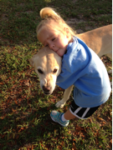Shiny New Objects! Several weeks ago I was lucky enough to be able to attend Clicker Expo in Arlington, Virginia. I love the opportunity to spend time connecting with colleagues and students, learning interesting new things, and of course, buying…
Blog Archives
Shiny New Objects!
Posted in Dog behavior, Dog training, Dog/human relationship, Educational, Misc, Positive Animal Training, Technology, Training tools
Understanding Dog Body Language
From Auspicious Beginnings to a Hard-won Solution – Malena DeMartini
From Auspicious Beginnings to a Hard-won Solution – Malena DeMartini My second client ever (circa 2001) was a separation anxiety case. The dog’s name was Guinness, like the beer, and his guardians had found him sickly and tattered, scavenging for…
Separation Anxiety: The Forgotten Stepchild We Can No Longer Ignore
Separation Anxiety: The Forgotten Stepchild We Can No Longer Ignore Each morning when I fire up my computer, the eager ding of incoming emails greets me and I know to expect at least one new inquiry — if not three…
Posted in Dog behavior, Dog training, Dog/human relationship, Educational, emotions, Positive Animal Training, Psychology, Separation anxiety, Technology, Training tools
Calming signals- Are they truly signals or calming?

Calming signals is a term brought forth by Norwegian dog trainer Turid Rugaas (2005) to describe behaviors that dogs display when trying to calm down a situation. In animals living in groups, it’s important to have ways of communication that…
Posted in Dog behavior, Educational, Fear, Misc, Psychology, science
Does the concept of dominance apply to dogs? Science says it does

Is there a behavioral concept that we can describe as dominance between dogs or between dogs and people? As I had mentioned in a previous blog “Dominance and pack leadership in dogs – Controversial and still misunderstood“, there seems to…
Posted in Dog behavior, Dog/human relationship, Educational, Psychology, science, Wolves
When science and dog training come together – SPARCS 2014

Dog lovers from all walks of life are often convinced that they have a fairly strong understanding of dog behavior. From the dog guardians to the dog professionals, most feel confident about interpreting canine behavior and are quick at dispensing…
Posted in Dog behavior, Dog training, Dog/human relationship, Educational, Misc, science
Learning theory basics – Part 2: Operant conditioning: if it works do it again!
How Do Dogs Think? The Scientific Revolution in Dog Intelligence

When I first started to study dogs from a scientific perspective, finding research on canine behavior was a long and difficult task. It wasn’t just because at the time we didn’t have Internet and most of the publications had to…
Posted in Dog behavior, Dog/human relationship, Educational, Psychology, Resource, science
Treated fear can return – even to the next generation

As I have mentioned in a few other posts, the vast majority of behaviors that we deem problematic in our dogs, such as, barking, biting, lunging, destruction, separation anxiety or resource guarding, stem from the dog’s fear, anxiety or panic.…
Posted in Dog behavior, Educational, Fear, Psychology, science


